| Srl | Item |
| 1 |
ID:
132358


|
|
|
|
|
| Publication |
2014.
|
| Summary/Abstract |
How and to what extent is the preventive use of force becoming the future of foreign policy for states around the world? We explore the spread of preventive logic to increasing numbers of states and examine the degree to which an international norm toward preventive self-defense is cascading in the international system. Through content and comparative case study analysis, we investigate leaders' rhetoric and security policies concerning what we theorize is the key indicator of a country's emulation of the United States: assertion of the right to the unilateral, preventive use of force outside of its borders. Our evidence indicates that there has been a shift away from the established international norm-which considers the use of preventive force illegal and illegitimate-toward growing acceptance of unilateral preventive strategies, a shift largely propelled by the precedents set by the United States in the war in Iraq and its use of unmanned aerial vehicles (UAVs or drones) in the global war on terror. Our findings also reveal that some states are applying the strategy of preventive self-defense beyond the use of UAVs for targeted killings to the extreme contingency plan for nuclear war. We conclude by discussing possibilities for further research and considering the implications of this phenomenon.
|
|
|
|
|
|
|
|
|
|
|
|
|
|
|
|
| 2 |
ID:
131978
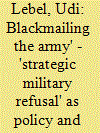

|
|
|
|
|
| Publication |
2014.
|
| Summary/Abstract |
The study shows how 'strategic military refusal' in Israel developed as a rational and institutional means to influence security policies. As opposed to the perspective that sees military refusal as a spontaneous individual act, the study illustrates how organizations operate to distribute military refusal in order to pressure decision-makers to change their military policies. This strategy has proven to be effective when the military is involved with groups that threaten it with refusal - which threatens the military's operational ability and its official and apolitical image. These include soldiers whose civilian authorities, rather than their military commanders, are perceived as an epistemic authority regarding security issues. The case study refers to the impact of strategic military refusal in Israel on security policies and the military doctrine. This was influenced by leftist groups, which, although they belonged to the parliamentary opposition, had dominant presence in the military ranks. Furthermore, the study examines the effect of the use of strategic military refusal on the model of military recruitment.
|
|
|
|
|
|
|
|
|
|
|
|
|
|
|
|
| 3 |
ID:
186205
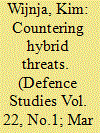

|
|
|
|
|
| Summary/Abstract |
The COVID-19 pandemic demonstrates once again that hybrid threats are increasingly challenging European countries. Although there is international cooperation on the conceptual level, individual countries are responsible for the actual implementation of counter hybrid measures. This article compares the approaches of Finland, Germany and the Netherlands to counter hybrid threats, while taking into consideration their strategic culture. It shows that the countries differ in their approach to counter hybrid threats in terms of their organisation of security and the scope of measures taken to deter adversaries. These differences are mainly rooted in historical, institutional and political processes. The countries are rather similar in detecting hybrid threats and responding to hybrid attacks, which can be explained by the nature of hybrid threats. Consequently, strategic culture is a context that shapes but not ultimately determines how Finland, Germany and the Netherlands counter hybrid threats. The results of this article suggest that our current understanding of strategic culture is insufficient to describe and explain an actor’s security policy in the contemporary security environment. It is recommended that the concept of strategic culture should be revised and has to be examined more broadly by including national security issues and a broad spectrum of instruments of power.
|
|
|
|
|
|
|
|
|
|
|
|
|
|
|
|
| 4 |
ID:
113284
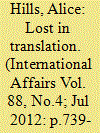

|
|
|
|
|
| Publication |
2012.
|
| Summary/Abstract |
The transfer of democratic values and practices such as community-based policing to African police forces is a key aspect of western aid and security policies, yet the cultural transmission on which it depends is not fully understood; the ways in which African officers respond to theories and practices imported from western societies has yet to be assessed critically. Further, despite decades of international support for police reform and re-education, there is little evidence to support the assumption that the skills, technologies and procedures associated with western policing can act as an effective channel for the transmission of democratic values. This article uses the Nigerian police's response to both externally funded and internally generated reform projects to address a question with implications for policy transfer more generally: what explains the uneven transmission of politically sensitive forms of knowledge? It discusses how imported ideas and practices are received by Nigerian officers and political elites, and how they are transformed having been filtered through local interests and dispositions. It shows that even when the process of reform is accepted, the political will required to ensure its effective implementation is not. Democratic practices do not travel well because recipients respond to imported practices in an adaptive manner, integrating aspects of donor understanding and indigenous realities.
|
|
|
|
|
|
|
|
|
|
|
|
|
|
|
|
| 5 |
ID:
159645
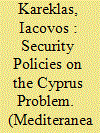

|
|
|
| 6 |
ID:
125880
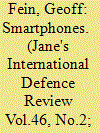

|
|
|
|
|
| Publication |
2013.
|
| Summary/Abstract |
Although making headway across the Atlantic, the path forward for European users looking to make military use of commercial smartphones continues to be lined with obstacles, not least of which is agreeing on security policies for the devices, Geoff Fein reports that while challenges are many, there is light at the end of the tunnel.
|
|
|
|
|
|
|
|
|
|
|
|
|
|
|
|